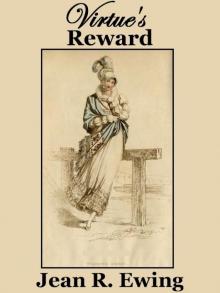- Home
- Jean R. Ewing
Scandal's Reward Page 3
Scandal's Reward Read online
Page 3
“Don’t be pompous, George! It doesn’t become you. I was, of course, turned away when I humbly presented myself at the front door. Such a lamentable lack of family feeling! But no matter, he who is denied entrance by the door must needs come in at the window.”
“What can you want here?” Lady Montagu said faintly. “Oh, this is all quite dreadful!”
“Then I am sorry to distress you, Aunt.” Dagonet bowed his head with perfect courtesy. “But I came among other things for the family jewels. Don’t move, George! If I were forced to kill you, there would be no one to inherit Lion Court from our grandfather. Charlotte, you really should take a seat and close your mouth.”
While George sputtered and the ladies wrung their hands, Devil Dagonet moved smoothly from one to another and divested them of their jewelry. Catherine, forgotten by the piano in her plain frock, moved as quietly as she might around the sofa and the Sheraton chairs to the bellpull beside the fireplace. So the insolent stranger on the moor had been the notorious Dagonet! He should not get away with stealing the jewelry if she could help it.
She had the bellpull in her hand and was about to give it a mighty pull, when the entire length of silk cord, suddenly severed, slithered past her arm and coiled on the floor at her feet. A small knife, expertly thrown, quivered in the cornice above her head.
Dagonet was looking straight at her, his eyebrows very slightly raised.
“I do not believe,” he said with unstudied grace, “that I have had the pleasure of making your acquaintance?”
She met his gaze steadily, though her breath was coming uncomfortably fast, as if she had just raced up six flights of stairs.
“My name is Catherine Hunter, sir. I am Lady Montagu’s companion. We met, in case you have forgotten, on the moor. It seemed to me to be about time to interrupt this melodramatic little scene by inviting in some other members of the household. I don’t suppose that even you can shoot both Sir George Montagu and the butler at the same time. However, you have severed the bellpull, and neatly prevented me from being the heroine of the hour.”
“Ah, the servants.” He seemed to consider for a moment. “Unaccountably, it has occurred to no one to scream, Miss Hunter. Perhaps the family do not wish any witnesses? Or,” he looked straight at George, “perhaps they do not wish me to meet certain members of the staff?”
Catherine stood her ground. “Perhaps they are simply embarrassed by childish games. It is already distressful enough for Lady Montagu to have a nephew whose name is used to frighten children in the village, without having the pearls removed from around her neck in her own drawing room. Not having any such scruples myself, of course, I could very well cry out for help.”
“And I do not frighten you, Miss Hunter? A brave young lady! I am, according to my own cousin, my companion from childhood, a scoundrel and a blackguard. Each member of the household has given me some token of their wealth. Since you are determined to be included in this family scene, is there nothing you can contribute to my venality? Nothing I can steal from you?”
Catherine hated the way she knew the color was rising in her cheeks as he walked slowly toward her. The sea-green gaze swept over her simple frock in the most insolent manner. For no good reason Annie’s silly words kept running through her mind, ‘He’s had tons of lovers,’ and Amy stating with such confidence, ‘It was because of his reputation with the ladies that they called him Devil Dagonet.’
He shall neither charm nor frighten me, she promised herself. He shall not. I shall scream if he comes a step closer. Yet her breathing was already shattered, out of control.
He thrust the pistol in his belt, stopped directly in front of her, and reached long fingers to her cheek. He brushed a stray wisp of hair from her neck and touched tenderly below her ear. She was desperately aware of the soft pressure of his fingers and of his clean, masculine scent: plain soap, and the outdoors, with perhaps the faintest hint of brandy.
“A lock of hair, perhaps?”
She met his gaze defiantly. There was something so magnetic and powerful about him! “I do not give you any such permission, sir.”
“But I must not disappoint our audience,” he said. “After all, I have my reputation to live up to. Since you refuse me the gift of your hair, Miss Hunter, I shall have to steal a kiss.”
Surely she could have cried out for the servants then, but she felt stunned into silence. For in the depths of his eyes she saw the last expression she would have expected: neither anger nor malice, only a rueful laughter, ruthlessly buried. Helpless with astonishment, Catherine lost all sense of where she was: the candlelit room, its scandalized occupants, all disappeared from consciousness as unwittingly she gave herself up to his embrace.
He tilted her head and his fine lips closed over hers. An aching sensitivity inflamed her blood. Her tongue tasted honey, tender and sweet. Strange delight flooded through her body: a terrible, wonderful anguish—like the gift of an angel!
Moments later he kissed her throat tenderly, then murmured against her ear.
“I apologize for not being sucked down in Rye Combe Bog as you directed. It did display scurrilous manners not to instantly die so, after treating you so cavalierly. Though it’s no excuse, I was rather preoccupied and, of course, I’ve known the track perfectly well since childhood. I hope you’ll forgive me, Miss Hunter, but please don’t call the servants. I don’t want to have to slay any of the footmen.”
He pulled away and crossed the room. No one had moved. They stood like pawns awaiting the hand of the chess master. Catherine felt bereft, her heart thundering.
Dagonet laughed aloud. “I thank you all for your contributions.” Turning to Catherine, he swept her a bow, then sat on the windowsill, folding the ladies’ gems and his cousin’s diamond pin and fob watch into his pocket handkerchief.
“Damn you, Dagonet! What do you intend to do with the jewels?” It was Sir George, his face suffused with anger.
“Why, what would you expect me to do with family heirlooms? Sell them and support my dissolute lifestyle, of course.”
“Then you can go to the devil!”
Dagonet’s eyes opened a little in amused astonishment. “How can I possibly go, George, where I already reside?”
The curtains parted and fell together again and he was gone.
Catherine brutally ignored her own emotions. Her hands were full with two hysterical women and a puce-faced man who was throwing back glass after glass of brandy, while doing nothing whatsoever to recover the stolen property.
Just as she finished with the burnt feathers and the smelling salts, Sir George turned to the women and said, “What the deuce did he mean by that Horatio stuff? Damn him!”
The vicar’s daughter was the only one who could answer.
“William Shakespeare, Sir George. Hamlet, Act one,” Catherine said. “When the ghost of his father appears to Hamlet. I believe Horatio replies something like this: ‘In what particular thought to work I know not; / But, in the gross and scope of my opinion, / This bodes some strange eruption to our state.’ I fear we may be in for some disruption to our peace and tranquillity here at Lion Court.”
Chapter 3
Devil Dagonet rode straight along the coast road through Fernbridge to Stagshead. He had left his horse, since he had been so unceremoniously turned away from the stables, tied to the railings in the woods at Lion Court. At Stagshead, in contrast, he had no such difficulty, for he put his mount into a loose box and rubbed down the gray himself.
A few minutes later he strode unchallenged into the study and poured himself a glass of brandy, then dropped with the simple ease of the athlete into a chair beside the fire. He propped his booted feet on the fender and leaned back, the firelight playing over the planes of his face.
Before long, quick footsteps sounded in the corridor, the door was flung open, and Captain David Morris stood framed on the threshold. Dagonet casually turned his head and at the look on the newcomer’s face burst out laughing.
; “What did you fear, Captain? That I should be chained in a dungeon by my cousin and be removed forever from the company of civilized men? Fortunately, Lion Court doesn’t possess an oubliette, much to my great regret as a boy. I will freely admit, however, that the meeting was quite unpleasant, and if cousin George were a medieval baron and not a modern man-about-town, you might now be hearing the echoes of my groans, hollow in the moorland mists.”
“But he must have been expecting you? Surely out of common courtesy he would receive you with good grace? You’re first cousins.”
“And blood is thicker than water? But, my honest friend, Sir George Montagu has no blood in his veins, only bile. Of course he was expecting me! I have written to him at least three times this last month. Any courtesy in our exchange, however, has been entirely on my side. His only response was a damnably rude warning to keep away. He was no more sympathetic in the flesh.”
“So he refused you the house?”
“He did more. He had told the servants to set upon me with horsewhips. It was only my insufferable charm that persuaded them to desist, and the skills that we honed together in the Peninsula. So, after escaping from the dubious welcome of the henchmen, I crept in at the window, instead, and awaited my loving relations in their own drawing room.”
“Charles, you didn’t!” Captain Morris poured himself a drink and sat down opposite his guest. His brow was still marred by a slight frown of anxiety.
Dagonet tossed back his brandy. “You should have been there. Not only did I enter the house like a common thief, but then conducted myself in a perfect imitation of Tom Faggus, the famous Exmoor highwayman. Here’s my haul!”
He set down his glass. The jewels slid from his pocket and lay bright in the candlelight across his lean hands. “Rather pretty, don’t you think?”
Captain Morris leaned forward. “May I?” he said, taking the diamonds. “These must be worth a fortune, Charles.”
“Before the Revolution my father had considerable wealth, and my mother, they say, was a beauty. The diamonds she wore at the court of Marie Antoinette and sometimes she displayed these pearls entwined in her hair. I remember it. They’re all I have left of her.”
“Should you not have had these years ago?”
“Well, of course. But I was under age when I left Lion Court and then I was abroad. I didn’t learn until I came back to London this May that George had seen fit to hold them for safe keeping and would refuse to give them up.”
Captain Morris turned the diamond necklace over in his hands, blue fire sparking in each facet. “What will you do with them now?”
“It’s a problem, isn’t it? Slightly odd possessions for a man who is otherwise without a penny to his name. Until I can find a woman who deserves to wear my mother’s jewelry, I rather hoped you would keep them for me in your safe.”
“Of course.”
Dagonet wrapped the pearls and gave them, too, to David Morris. The captain stood and laid them carefully away before returning to his chair. “So your cousin just handed you your property without a squeak? I don’t believe it. Surely he had hidden such valuables?”
“He squealed like a stuck pig, but he couldn’t deny that he had my mother’s things, because they were happily on public display. My aunt and my cousin Charlotte were wearing them. And George himself had graced his burgeoning chest with my father’s French watch and diamond pin.”
“Good God! I’m surprised you didn’t knock him down.”
“If Catherine Hunter hadn’t been there, I might have done. Yes, your fiancée’s sister. She appears to have taken a post as companion to Lady Montagu. Why didn’t you tell me, I wonder?”
“Well,” Captain Morris said, “it’s rather damnable, isn’t it? But she wasn’t involved in all this, was she?”
Dagonet laughed out loud. “She rather involved herself, I’m afraid. I had to kiss her.”
Morris leapt to his feet. “You did not! I ought to call you out.”
Charles turned the considerable power of his attention on his friend. “Why? You know you would die if you did, unless I was foxed enough to merely lie down before your chivalrous onslaught and let you slay me. Besides, I rather believe Miss Hunter can take care of herself. A remarkable young lady! She very nearly called for the butler and ruined everything. I had to stop her.”
“By kissing her?”
He shrugged, though he felt less casual about it than he wanted to admit. If he closed his eyes, he could see her slim elegance as vividly as if she still stood before him. Her dark hair had been drawn back in a simple knot which only accentuated high cheekbones and magnificent hazel eyes, lashed like a deer’s. In that moment she had become stunningly lovely, infinitely desirable. Without even trying, she had shaken something in him, too deep for comfort.
Ruthlessly Charles suppressed the memory of her brave defiance, of her innocent passion, and smiled.
“Indeed! Anyway, I’m hardly in her good graces. I almost ran her down with my horse on the moor on my way here, and she had not forgiven me.” He stood up in one fluid movement and took up a violin that had been lying on the table. “Not having seen Lion Court in seven years, I regret that I was victim to several rather maudlin sentiments and was unforgivably rude. Now I have compounded it.”
“Good God, I should think so!”
“Nevertheless, I do promise you, David,” Devil Dagonet said with a bow, “that I shall not involve you in my sordid affairs any more than I can help it, and I certainly shan’t compromise either Miss Catherine Hunter or her sister.”
Then, with casual skill, he began to play.
* * * *
There was to be no more music at Lion Court that evening. Lady Montagu, proclaiming herself prostrate with shock and distress, dispensed with the services of her companion and retired for the night. Her son, Sir George, disappeared into the study where Catherine had no doubt that he would keep company with several bottles of port. Charlotte, after pronouncing several unflattering comparisons between the hapless way that her brother had handled their unwelcome visitor and the aplomb that the late Mr. Clay would surely have displayed, also made moves to retire.
“I am sorry that you should have been obliged to witness such a thing, Miss Hunter, and that your manner should have invited such an insult from my cousin. I trust it goes without saying that no word of tonight’s unfortunate occurrence will be breathed outside this house. I hope we may rely on your sensibility, if not your discretion?”
“You may trust my discretion absolutely, of course, Mrs. Clay.”
“Then that’s settled. I felt I should mention it, not knowing if our standards of behavior were what you were quite used to. Mr. Clay always felt one should make sure of these little matters. Your difference in station was obviously very clear to my cousin Dagonet. May I bid you good night?”
Catherine, quite speechless, watched the door close behind her. How dare the woman suggest that she had invited Dagonet’s kiss! Yet she had no desire to dwell on what had happened. Devil Dagonet was insufferable and his family deserved him.
She was about to go to the piano to put away the music that she had selected earlier, when she noticed the bell rope lying where it had dropped on the floor. There was no sense at all, she supposed, in leaving it for the housemaids to discover and gossip over.
Without hesitation, she pulled over a chair. Climbing from it to the side table, she was able to reach the little knife that still pierced the cornice. It had been thrown, as she had been kissed, with an unsettling degree of competence.
Catherine bit her lip and set the knife on the mantelpiece.
The end of the silk cord was still attached to an iron loop that connected the bellpull to the butler’s pantry by means of a wire. It would not take very long, she decided, to remove the frayed stub and weave the end of the length of rope onto the metal ring, thus producing a bell cord only slightly shorter than before. She was intent upon this task, which was an uncomfortable reach above her head, when the door
opened and one of the housemaids came in with the coal scuttle.
The bucket hit the floor with a crash.
“Oh, ma’am! You gave me such a turn. I thought the family had all retired. I’ll come back and do the fire later.”
“No, it’s all right, Mary, go ahead!”
Catherine felt perfectly ridiculous. She had finished with the bell cord, but was still standing on the side table. Mary ignored her awkward situation and matter-of-factly retrieved the coal scuttle. She set it down by the grate.
“Can I help you down, ma’am?”
Catherine nodded and put out her hand while she tried to think of some rational explanation for why she should be climbing on the furniture, when the maid’s next utterance put it quite out of her head.
“It was Devil Dagonet come back, wasn’t it, ma’am?” Mary’s sharp eyes moved to the frayed butt of the rope, where Catherine had discarded it. “He got in, after all?”
“How on earth did you know?”
“Because Potter and some of the lads was set to watch for him days ago.”
“You mean he was expected?”
“Must have been, ma’am. Else Sir George wouldn’t have set up a guard, nor told me to keep to my room. But Potter and the three lads was found all trussed up with rope and tied to the trees in the drive, and Potter’s been given a shiner. Dagonet was always handy with his fives, ma’am, even as a lad.”
“Good Heavens! He was alone against four men. But why should you keep to your room?”
“Sir George fears that his cousin wants words with me.”
“With you, Mary? But why?”
The housemaid looked away, her hands, white-knuckled, clenched in her apron. “I’m married and taken a different name now, of course, but you see, Milly Trumble, as was drowned, she was my sister. Well, I mustn’t stand here talking, I’ve my duties to attend.”
Mary turned and left. Catherine stood by the fire for a moment. So Dagonet had come back for more than to steal the jewelry. He wanted to find out something from Mary. Was the girl in danger? She had a sudden dreadful misgiving that she hadn’t seen the last of Devil Dagonet.

 Rogue's Reward
Rogue's Reward Scandal's Reward
Scandal's Reward Valor's Reward
Valor's Reward Folly's Reward
Folly's Reward Virtue's Reward
Virtue's Reward Love's Reward
Love's Reward